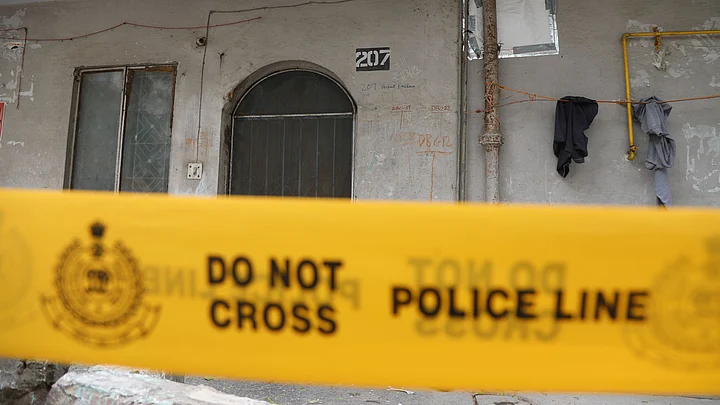(If you feel suicidal or know someone in distress, please reach out to them with kindness and call these numbers of local emergency services, helplines, and mental health NGOs.)
Nestled in one corner of south Delhi's Vasant Vihar is house number 207 – an address whose occupants mostly kept to themselves.
Manju Srivastava, 54, and her two daughters Ankita, 30, and Anshika, 26, barely interacted with neighbours, and stepped out only to visit the kirana (grocery) store or to dry clothes.
So, when the family of three sealed all the airways to the house, set up three smouldering pots of coal, and died, no one noticed for hours.
They even left behind a note saying, "Too much deadly gas…CO inside. Pls ventilate the room by opening the window and switching on the fan. Do not light match, candle or anything!"
According to a report in The Indian Express, Deputy Commissioner of Police (Southwest) Manoj C said that the family had left four notes behind, in which they have not blamed anyone.
Manju's husband Umesh, who was working with a CA, was the sole breadwinner. He had succumbed to COVID-19 in April last year, leaving a bedridden Manju and her two unemployed daughters behind.
"They were upset after Umesh's death and were also in a financial crisis," DCP Manoj was quoted as saying.
Family Never Displayed Emotional Distress, Says Domestic Worker
It was on the evening of 21 May, hours after the three women died, that the matter came to the fore. Kamla, who was earlier employed as a domestic worker at the Srivastavas household, raised an alarm when, despite repeated knocks on the door, she didn't get a response.
As no one responded for over 30 minutes, Kamla informed other colony residents who then began looking through the window, only to find that it was completely sealed.
After much effort, they pierced the sealed window, and found three bodies lying inside the room.
Two days after the deaths, Kamla told The Quint, "They couldn't keep me employed after the first wave of COVID as they couldn't pay me." The family was also in debt, and collectively owed over Rs 30,000 to two shopkeepers who delivered groceries.
Despite not being employed full-time, Kamla would often meet the family, and help run errands. "They never mentioned what they were going through or the problems they were facing. I would often get groceries for them, and if they didn’t have money, they would ask me to get it on credit. Sometimes, I would pay from my own pocket too," said Kamla.
She said that she never kept a track of the money the Srivastavas owed her as they were like her "own family."
Family Didn't Have Money, Neighbours Paid for Father's Funeral: RWA Chief
Things didn't suddenly go bad for the Srivastavas in the last few months. When Umesh passed away in 2021 due to COVID-19, the family didn't have enough money to do the last rites.
"When Umesh died, we asked the family if they needed any help. They said they didn't have any money, so we collected Rs 25,000 from neighbours and helped them complete all the rituals," says Residents Welfare Association (RWA) president David.
In the notes, the women have mentioned lack of emotional support as a reason as well. Kamla said, "I know that no one visited the family in the last one year since Umesh ji's death. No one checked in on them to see how they are doing. When he passed away, two relatives showed up and did the last rites. That's all."
Kamla, who worked at the Srivastava household for a long time, said that Manju was bedridden for many years, and Umesh ran the house. Their daughters stayed at home mostly to take care of their mother, and on the rare occasion they did step out, they were accompanied by their father.
Family Fell on Hard Times, Lived on Credit: Shopkeepers
A couple of metres away from house number 207 lies the Jain grocery store from where the Srivastavas would buy food items on credit.
Neelam Jain, proprietor of Jain Store, said that following Umesh's demise, the daughters would always ask for groceries to be delivered at their doorstep.
"Four months ago, that also stopped because there was an outstanding amount of Rs 6,200. I asked them why they stopped buying from me, and they would say that they wanted to clear the existing dues first."Neelam Jain, Proprietor, Jain Store
On 19 May, Kamla had her last conversation with the family, when Manju’s youngest, Anshika, asked her over a call to inform Jain Store that their dues will be cleared by 21 May – the day they were all found dead at home.
On 21 May, as promised by the Srivastavas, Hans Kumar, the husband of the owner of Jain Store, knocked on their door but didn't get a response. It was then that he asked Kamla to try, who also didn't get a response, and raised an alarm.
Apart from Jain Store, the family also owed money to Kamal Singh, who runs a shop in the same colony. "Usually they would pay the credit amount for two-three months in one go."
"The current sum stands at Rs 20,000-25,000 for the last four months. They have been residents of this area for many years. They fell on hard times but we never imagined such a day would come," he said.
When asked why he had extended such a huge line of credit, Singh said that the family had fallen on hard times following their father's demise.
"They have been staying here forever. Who knew that this would happen?" he added.
(At The Quint, we question everything. Play an active role in shaping our journalism by becoming a member today.)
